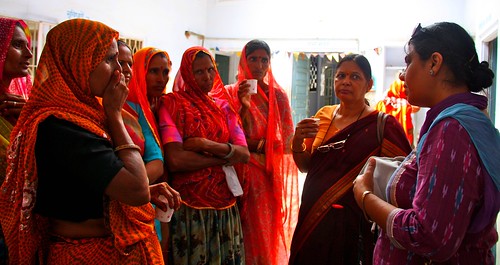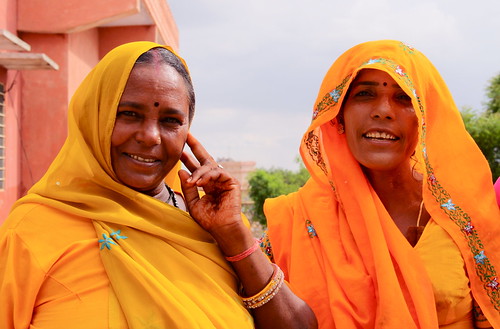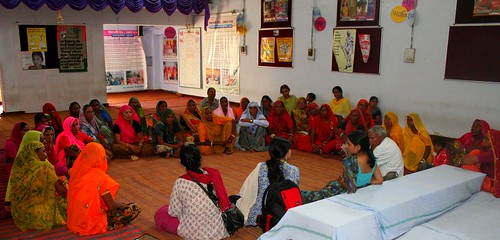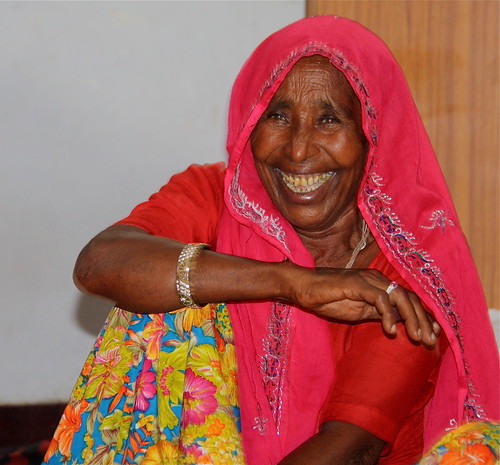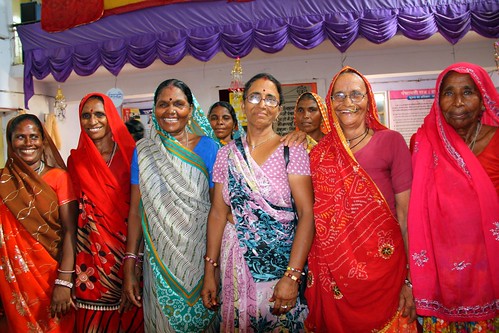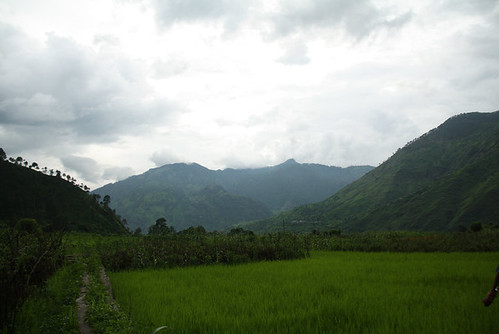The following blog post was written by Advanced Training Participant Nansubuga Immaculate. Immaculate is a Trainer-In-Training at the 2011 East African Women and Water Advanced Training in Kampala, Uganda, where she is training to become a Water, Sanitation, and Hygiene (WASH) practitioner. She has come to the training from Katosi, Uganda, along with two other women from her organization, Rose and Mastuula, who participated in the Grassroots Women and Water training. You can read Immaculate's inspiring story below.
 |
| Nansubuga Immaculate (in pink hat) at the 2011 GWWI Training in Uganda. |
While at work, my boss sent me a link to the 2011 Global Women’s Water Initiative (GWWI) East African Women and Water Training in Kampala, Uganda and encouraged me to look it up and apply. Honestly, it took me a whole week to visit the link. But when I did, I just knew I could not miss out on this opportunity. Prior to the training, I believed that I was not a whole woman leader, even though my profession required good leadership traits. Despite this, I wanted to attend the GWWI training because I considered it a great opportunity to elevate my Water, Sanitation and Hygiene (WASH) skills and bring positive change to the Mukono community, especially among the women from Katosi Women Development Trust (KWDT). The action-planning component of the Training appealed to me. I have always wanted to know how to make an action plan and be able to implement the strategies from start to finish. Despite my keen interest, I questioned my ability to contribute to and qualify for the 2011 GWWI Training. After all, I had never attended a GLOBAL conference before.
Despite my fear, I was selected to be a participant (Trainer-in-Training) of the first annual GWWI Advanced Training Program, where I joined an amazing group of women leaders from around the world to discuss water and sanitation issues that threaten East Africa. During the training, I yearned to be a loud and strong speaker, but I realized that I am soft-voiced. Thank God for the Personal SWOT [Strengths, Weaknesses, Opportunities and Threats] analysis. Through this exercise, my leadership style was realized, and I gradually understood that my weaknesses are another’s strengths and that working together makes our impact stronger. I am now content with my communication skills. I am soft-voiced, but firm and eloquent, which is an added advantage while facilitating trainings, interviews, and the one-on-one conservations that I facilitated during the Grassroots Training. Using my new-found strengths, I discovered that though quiet of voice, I can still be a strong lobby for rural communities to achieve equal development.
Katosi Women Development Trust (KWDT) selected Rose and Mastuula to attend the 2011 Grassroots Training in Kampala. Mastuula and Rose saw the training as a great opportunity to learn to construct a Biosand Water Filter (BSF) to increase access to clean water in women-run households throughout the Katosi District. At the training they stood beside their East African sisters, affirming that women are the water stewards in their communities and have to stand up and act for themselves--especially widows. Women should stop self-pitying themselves because it is a strong contributing factor to under-development in rural communities. Through the training, they embraced the power of collective sharing, working in sisterhood with participants from communities throughout East Africa to change attitudes and negative behaviors of communities towards water, sanitation, and hygiene (WASH).
At the training, we learned that it is crucial to consider and integrate all community stakeholders and their needs when establishing any new water project. We covered sessions on climate change, leadership, WASH and appropriate technologies. The climate change sessions really resonated with me. In my community, climate change and its impacts are gradually affecting the livelihoods of the rural people. Their economies, health and environment are dwindling. The last long dry spells early this year affected agricultural productions and contributed to scarcity of water. Three KWDT women’s cows died and over ten were infected with diseases. The reduction in food productivity led to malnutrition, and scarcity of water increased poor sanitation--especially in schools and communal centers. My team identified the need for our community to be sensitized and made aware of the climate change impacts, mitigation, and adaptation techniques.
And to achieve my team’s WASH vision of “increased accessibility to clean safe drinking water in rural households,” we have to use an inclusive and participatory approach. My team wants to achieve this big vision of all rural women living healthy lives and empowered to participate in economic, social, and political development processes. We also want to be free from dependency and achieve self-supply of not only WASH facilities, but also what the world offers for a better change among rural women.
So, this training is a big step to achieving our goal. Though this is a big challenge ahead of Katosi Women, we have to put the fears aside and stand strongly to achieve this.
Thanks to Gemma, Jan, Maame, Debbie, Beth, Women’s Earth Alliance, iCON, Crabgrass, the GWWI participants, the strong communities and NGOs for enabling us to take this step.
EEEEEE….. WOMAN EEEE…!!!

















